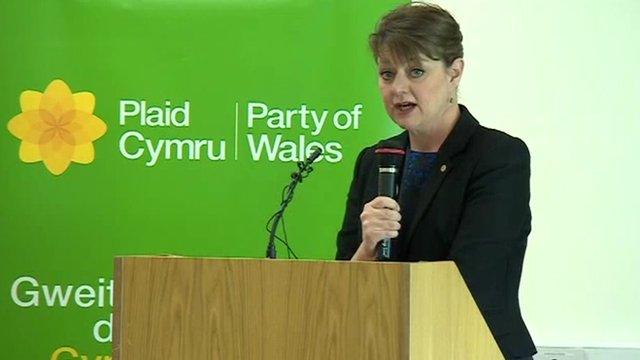Plaid's manifesto
- Published
- comments
There are no shortage of sweeteners for Wales in Plaid Cymru's glossy 64 page manifesto.
The biggest one of the lot, an extra £1.2bn for Wales, isn't even mentioned but implied when it talks about Wales receiving the same level of funding per head as Scotland.
They would also commit to spending 1% of GDP towards infrastructure projects which they say would equate to £800m for Wales.
There are many others such as an extra 1,000 medical staff, taking 70,000 firms out of business rates and the creation of 50,000 extra jobs by giving more public sector contracts to Welsh firms.
They also oppose some big ticket revenue items for the Treasury such as most of the welfare reforms and the rise in the state pension age.
Key priorities
Plaid Cymru
Main pledges
- Living wage for all employees by 2020
- Extra 1,000 doctors for Welsh NHS
- Scrap Bedroom Tax
- Transfer control of criminal justice system - including policing - to Wales
- Oppose renewal of the Trident nuclear weapons system
- Wales to get same powers as Scotland. Also similar funding - additional £1.2bn each year
Deficit
So how will it all be paid for and what is their attitude to paying off the deficit?
For the record, the deficit is mentioned twice in relation to finances.
My colleague David Cornock went to a pre-budget briefing earlier this month where Plaid appeared keen to kill off any impression of them being reckless spenders and where they acknowledged the need to reduce the deficit.
To be fair, the manifesto is not all about spending.
Plaid plans to reintroduce the 50p income tax rate for all those earning more than £150,000 as well as increasing the upper limit on on national insurance contributions.
National insurance
Currently everyone earning between £8,060 and £42,380 pays 12%. After that it drops to 2%. Plaid would maintain that 12% rate until you earn £100,000 or above.
They would also end the pensions relief for higher rate taxpayers and double the bankers' levy, and there would be the so-called "pop tax" or levy on sugary drinks to pay for the extra medical staff.
Plaid says the policies on national insurance and pension relief would save £100bn. They'd also save £100bn by scrapping a replacement of Trident.
At the earlier briefing, Plaid said they would "modestly" increase spending on government departments by 0.5% from 2016/17 onwards, which is important in that it shows there is a limit to how much they believe spending should increase.
Away from the finances, there are some interesting questions that arise from some of the manifesto commitments.
Migration
They talk about creating a Welsh Migration Service to ensure those coming into the country match the shortages in certain skills and also for Wales to become a safe haven for those displaced by war. The inevitable question here is what Plaid believes the numbers should be.
They also talk about introducing a fair pay scheme for companies to ensure senior executive pay doesn't streak ahead of workers' salaries and the introduction of supervisory boards, made up of elected workers, to scrutinise management.
It'll be interesting to find out over the next few weeks how they envisage these bodies working.
A final word on the controversial issue of welfare. On first glimpse it seems that Plaid are broadly in agreement with Labour in their opposition to the so-called bedroom tax and also their view that there should be a review of the universal credit before it's introduced fully.
- Published31 March 2015
